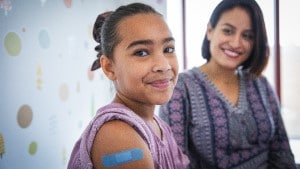What to know
- Low vaccination rates leave people at greater risk of serious illness.
- This season, respiratory illnesses have started later, returning to patterns typically seen before the COVID-19 pandemic.
- This means that the peak of respiratory illness activity is likely yet to come.
- There is still time to get vaccinated.

Summary
What CDC knows
Respiratory illness activity is rapidly increasing across the United States, yet vaccination rates for COVID-19, influenza, and respiratory syncytial virus (RSV) remain low. Millions of people may get sick in the next month or two, and low vaccination rates means more people will get more severe disease. Getting vaccinated now can help prevent hospitalizations and save lives.
What CDC is doing
CDC is reaching out to healthcare providers and clinicians to encourage them to recommend all patients receive all respiratory immunizations they are eligible for. On December 14, CDC issued a Health Alert Network (HAN) advisory to raise awareness about respiratory illness activity and urge action. To increase vaccination coverage, COVID-19 vaccines are available at no cost to people who are uninsured or underinsured through the Bridge Access Program.
Low vaccination rates leave people at greater risk of serious illness
The end of 2022 was a December we might not want to remember, as the fall and winter virus season came early. The combination of COVID-19, influenza, and RSV strained emergency departments and hospitals across the United States.
COVID-19, influenza, and RSV activity are still below levels seen last year at this time. This season, illnesses have started later, returning to patterns typically seen before the COVID-19 pandemic. This means that the peak of respiratory illness activity is likely yet to come.
Respiratory illness activity is rising
COVID-19 hospitalizations are rising quickly. Since the summer, public health officials have been tracking a rise in multisystem inflammatory syndrome in children (MIS-C), which is caused by COVID-19. Influenza activity is growing in most parts of the country. RSV activity remains high in many areas. In some parts of the country, hospital beds for children are already nearly as full as they were this time last year. If these trends continue, the situation at the end of this month could again strain emergency departments and hospitals. Strain on the healthcare system could mean that patients with other serious health conditions may face delays in receiving care.
On December 14, CDC issued a Health Alert Network (HAN) advisory to healthcare providers and public health officials highlighting the increased respiratory disease activity occurring in the United States, particularly in the southern part of the country, and internationally. The HAN noted that low vaccination rates for COVID-19, influenza, and RSV could lead to more severe disease and a strained healthcare system for the rest of the season. These low rates can also lead to more days of missed work and school.
More than just respiratory viruses are spreading
Other respiratory germs are also circulating. This year, public health officials are also tracking a recent increase of pneumonia in children around the world, which can be caused by many types of bacteria, fungi, and viruses. Staying up to date with vaccines against pneumococcal disease and pertussis (whooping cough) can reduce the risk of pneumonia from those bacterial infections.
It's worth noting that getting vaccinated against respiratory viruses can also help reduce the risk of getting pneumonia caused by bacteria and fungi. By preventing a viral infection, you keep your immune system strong and help prevent other germs from taking advantage when you're sick.
Get vaccinated today
Getting yourself and your loved ones vaccinated will help keep all of you healthy during the holiday season and into the new year. If more Americans are protected against severe respiratory illnesses, we will likely see fewer hospitalizations. Lives can be saved.
Vaccination is especially important for people at higher risk of severe illness from respiratory diseases, including young children, older adults, people with underlying medical conditions, and pregnant people.
Find out who needs COVID-19, flu, and RSV vaccines during the 2023-2024 season. And, get all the details on vaccines recommended for:
How to get the vaccines
CDC programs such as the Bridge Access Program, Vaccines for Children, and Partnering for Vaccine Equity are helping people get vaccinated to protect themselves during respiratory virus season.
If you have insurance, these vaccines should be free to you in most cases. Adults without health insurance or adults whose insurance doesn't cover all COVID-19 vaccine costs can get an updated COVID-19 vaccine for free through the Bridge Access Program. Most children can get recommended vaccines for free through their family's insurance or the Vaccines for Children (VFC) program.
Vaccines are available at various locations. Depending on your situation, you may get a vaccine at:
- Your healthcare provider's office
- Your local pharmacy
- Other locations, such as public health clinics, Federally Qualified Health Centers (FQHC), and Rural Health Clinics (RHC).
For help finding COVID-19 and flu vaccines, visit vaccines.gov.
There's still time to get vaccinated. Talk with your trusted healthcare provider about which vaccines you and your loved ones need to stay healthy this holiday season and into the new year.
